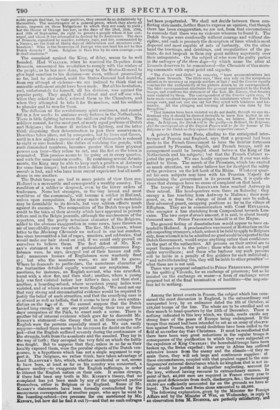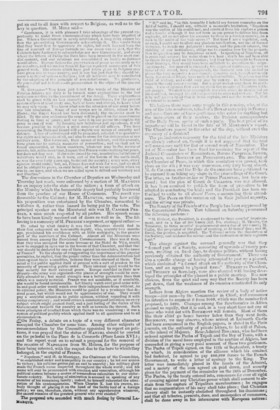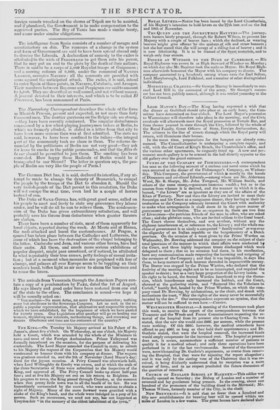Among the latest events in France, the subject which has
occasioned the most discussion in England, is the extraordinary and unexpected levy, by an ordinance dated the 5th of October, of 108,000 troops of the line. The whole are to be enrolled and on their march to head-quarters by the 25th of December. There is nothing indicated in this levy which, we think, needs excite any Strong fears of the peace of Europe being endangered. If the troops thus raised had been intended to act as an army of observation against Prussia, they would doubtless have been called to the field at an earlier day than Christmas. It must be recollected that there have been very great reductions in the regular troops in consequence of the purification to which they were subjected on the expulsion of King CHARLES: the household troops have been broken up, the Swiss expelled ; the army in Africa has suffered extensive losses from the enemy and the climate—if they remain there, they will ask large and continuous supplies : al these circumstances, coupled with that prudent regard to the co. n tingencyNof external disturbance which no kingdom that is not insular would be justified in altogether neglecting, account for the levy, without having recourse to extraordinary causes. In point of fact, 40,000 men are required in France every year to make good deficiencies from death, discharges, Sze. ; the remaining 68,000 are sufficiently accounted for on the grounds we have alleged. The Guards and Swiss alone amounted to 40,000. The following explanation, given by the Minister for Foreign affairs and by the Minister of War, on Wednesday, in reply to an observation from M. ETIENNE, are perfectly satisfa.ctory, ana put an end to all fears with respect to Begium, as well as to the levy in question. M. MOLE said " Gentlemen, it is with pleasure I take advantage of the present opportunity to make those communications which have been required of
me. When a Government is newly established, a long delay ensues be fore the pre-existing Governments acknowledge it. One would think that they want first to appreciate its rights, but such has not been the
line of conduct of Enrope towards us: our cause was SO jest, that the Cabinets have hastened to acknowledge our new Government, and every where the letters of Philip the First have been received -in the most cordial manner, and our relations are conmlidated as hastliy as distance would allow. Europe desires the preservation of peace as sin c erely as we do ourselves, anti we receive from all Europe repeated assurances of this general wieh. The events which have just taken place in Bi 'glum may have given ri;e to some anxiety, and it was hut just that they should become a mettcr of serious reflection ; but all interests may be conciliated by the adoption of the principle of non-interference. Na, gentlemen, the peace shall not be bi.olz:n —its preservation is the object of the general wishes.
M. GERARD—" You have jtirst heard the words of the Minister of Foreign Affairs ; my duty is to furnish some explanations to the last ordinance relative to the recruitment of the Army. These explanations shall be Own with no less sincerity Utah confidence; for the present system allows at least every one, both at home and abroad, to know what he may rely upon. You know what was the situation of our army before our late revolution. Some of our troops are in Africa, others in the Morea; the Royal Guard has been disbanded; the vacancies must be filled. By the new ordinance the army will be placed on the accustomary footing in time of peace ; and we have it in our power to complete the army in case of war. By forming new battalions and squadrons, it will become possible to replace a great number of old officers. Two laws concerning the National Guard will complete our means of security and defence. A-law of recruitment will be presented, calculated to guarantee the rights and interests of all, and also to atone for the deficiencies of our military code. Our fortresses, their means of defence, and the arsenals, have given rise to certain measures of precaution; and we shall not be found unprovided, or taken unawares, whatever may be the course of events; but, at the same time, I repeat that France wishes nothing but peace, but does not fear war. If she were forced to war, numberless battalions of -volunteers would rise, as it were, out of the bosom of the earth itself, , as -was the case forty years ago, to defend the country ; every arm, every opinion would unite; but, no, France does not wish for war, and we shall not be obliged to prove, as once before, of what we are capable when we rise in one MIMS, and when we are called upon to defend our territory and our liberties."
The diScussions in the Chamber of Deputies on Wednesday and Thursday last week, were enlivened by a motion of M. MAUGUIN for an inquiry into the state of the nation ; a form of attack on the Ministry which the honourable deputy had probably borrowed from the practice of our House of Commons. The result was favourable to the Cabinet ; for M. MAUGUIN, seeing how coldly his proposition was entertained by the Chamber, consented to withdraw it, rather than hazard its being Put to the vote. The principal speaker on the Ministerial side was M. CASIMIR PERRIER, a man much respected by all parties. His speech seems to have been kindly received out of doors as well as in. The following is a summary of M. PERRIER'S argument, or appeal rather:— He asked by what fatality it was that Ministers should find in their first antagonist an honourable deputy, who, scarcely two months ago, proclaimed his confidence with so little ambiguity, in the greater part of the members of the Cabinet. Almost all the Ministers were named from among the Provisional Commissioners. How was it then, • that they who occupied the same bivouac at the Hotel de Vibe, should now be engaged in open war in the bosom of that Chamber, and that that -war should be declared by one of them against his associates, in the name of France? To the charge of exaggerating the.importance of the popular assemblies, he replied, that the people rather them the Administration had risen against these assemblies, because they were alarmed at them. The mind of the public applied itself at present with a sort of passion to the necessity of preserving public order. Their internal quiet would be the best security for their external peace. Europe confided in their new dynasty—the army was organized—the places of strength would be carefully attended to but moral strength was a better eguarantee than that which was merely material. France was not assailable, or if assailable, she would be found invulnerable. Let liberty watch over good order within and good order would watch over their independence from without. As to external policy, the Ministers would be guided by a prudence that tie. sired peace, but which would not be apprehensive of war. They would pay a watchful attention to public opinion, without regarding it with undue complacency; and would evince a constantgood intention on every subject which might present itself, and a just feeling of the duties of the Government towards the country as well as towards the throne. Such were principles of conduct from which there-was no wandering : it was a system of political probity which applied itself to all questions and to all circumstances.
On Friday, a debate on a topic of a very different character occupied the Chamber for some time. Among other subjects of recommendation by the Committee appointed to report on petitions, it was prayed that the statue of MANUEL should be erected on the pedestal in thePlace de la Concorde (Place Louis XVI.) ; and the report went on to submit a proposal for the removal of the remains of NAPOLEON from St. Helena, for the purpose of their being interred, With the respect due to the hero to which they • belonged, in the .capital of France. .
e` Napoleon," said M. de Montigny, the Chairman of the Committee, • re-established order and ranquillity in our country ; he led our armies to victory; his sublime genius put an end to anarchy; his military glory made the French name respected throughout the whole world ; and his same will ever be pronounced with emotion and veneration, although his political system became a source Of tremendous calamities to our unfortunate country. No feeling of admiration is aroused in speaking of any member of his remaining family; indeed, he himself exhausted the admiration of his contemporaries. WhenCharles X. lost his crown, nobody thought of placing it on the head of the feeble tool of a foreign • policy; we can, therefore, claim, without any apprehension whatever, She sacred remains of the greatest general who ever existed."
The proposal was seconded with much feeling by General 14,mAnQux. " If," said he, "in this Assembly I beheld my former comrades on the field of battle, I should say, without a moment's hesitation, Napoleon was the victim of his confidence, and received from his captors a prison and a tomb : although it has not been in our power to deliver hint from captivity, let us not allow his remains to sleep in a foreign country, on a rock in the midst of the wide ocean ! ' But here I am a legislator, and, as such, I ought not to allow any glorious recollection, any ray of former victories, to dazzle my jaidgment : reason, and the general interest, the stability of our institutions, oblige me to examine how far the proposition in question may be dangerous or not. In speaking of Napoleon, all is grave and serious ; his name alone is a host : death has not been able to throw its icy hand on his remains ; had they been hroneht to France a short time ago, they would have been sufficient to overthrow the reigning dynasty. But now all is changed ; the rights of leen iseacv, as well as those of the sword, have disappeared; the electosal ern has dashed to pluces the holy atostottle; is new dynasty governs; toll, t o ugh yet newly born, the Cries o f Ii bert y hese made it im.lestr Lien hl e. poi no it was the child of v!ctory, and could only live by victory. In b:nitarous times force is the only power existing. But a ereat nation tear show its gratitude. I am of opinion that :low we claim the remaies of Napoleon \:,ithout danger. We shall thus accomplish the wish whielt he manifested on his deathbed, amongst his eld companions iu arms and viet ley. But let it be well known by all that it is the captain, and not the mon:Ire:a that we intend to honour."
We believe there were smile people in this countsT, who, at the nes of the late revolution, talked of a 13oataraara party in France ; and name than one of those gentlemen who cater for anything but the instruction of their readers, the Parisian correspondents of the Daily Press, spolso of ,Dell a party. The best proof of its importance will be found in the fate of M. MONT1GNY'S report. The Chambers passed to the order of the day, without even the ceremony of a division! The preliminaries necessary for the trial of the lila Ministers are already entered on, though it is not supposed that the trial will commence until the first or second week of November. The 1st of November has been fixed tbr receiving the report of the Judicial Ceounission of Examination, Barons Past-limn, SEGUR, BASTARD, and Douseer DE PONTECOULANT. The meeting of the Chamber of Peers, in which this resolution was passed, took place on the 4th ; it was very numerous, only forty being absent. M. de CHABROL and the Duke de GRAMMONT have petitioned to be excused from taking any share in the proceedings of the Court. The latter, as brother-in-law of Prince Pomo:vac, has been excused ; but the plea of Count de CHABROL was not allowed. It has been resolved to publish the form of preeedure to be adopted in conducting the trial; and the President has been authorized to write to all absent Peers, commanding their attendance. The Peers on this occasion sat in their judicial capacity, and the sitting was private. The Society of the Friends of the Peop'.e has been suppressed by the Correctional Police. That tribunal on Saturday pronounced the following sentence : "M. Hubert, the President, is condemned to three months' imprisonment, and to a fine of 300 francs (12/. 10s. sterling) ; M. Thierry, the Treasurer, to three months' imprisonment and a fine of 10'J francs; 111. Caffin, the proprietor of the place of meeting, to Id francs' tine; and M_ David, the printer, is acquitted. The Tribunal orders the dissolution of the Society, and declares the seizure and the destruction of their registers legal."
The charge against the accused generally was that they "formed part of a Society, consisting of upwards of twenty persons, meeting on fixed days, to discuss politics, without having previously obtained the authority of Government." There was also a specific charge of having attempted to post up a placard, which contained "a formal attack on the authority of the Chambers, and an appeal to physical force." HUBERT as President, and THIERRY as Secretary, were also charged with having developed the principles of the placard in a public meetiog. It is now obvious, from the quiet and easy way that the Society has been put down, that the weakness of its enemies constituted its only strength. Lettersfrom Algiers mention the review of a body of native troops-500 men—by the Commander in Chief; and announces his intention to augment it from 3000, which was the number first proposed, to 5000. Changes among the functionares in Africa proceed so rapidly, that it is said, in a very short time not one of those who went out with BOURMONT will remain. Most of them like their chief go home heavier laden than they went forth. BOURMONT, we may observe, whose arrival at Dilworth Castle had been announced in the English papers, is stated in the Paris journals, on the -authority of private letters, to be still at Pahua, in the island of Majorca. Rear-Admiral ROSAMEL, who had been ordered against the Pacha of Tripoli and the Bey of Tunis, with a division of the naval force employed in the capture of Algiers, has succeeded in giving a very good account of these two gentlemen. The Pacha of Tripoli signed, on the lith of September, a treaty by which, in consideration of the alliance which his conduct had forfeited, he agreed to pay 800,000 francs to the French Government, to write a letter of Apology to the King. The letter was immediately placed in the hands of the Admiral. and a moiety of the sum agreed on paid down, and security given for the payment of the remainder on the 20th of December. The Pacha, by the treaty entered into, renounces for ever all right of cruizing against any Christian power which shall consent to abstain from the capture of Tripolitan merchantmen ; he engages that no augmentation of his navy shall take place ; that Christian slavery shall be instantly abolished throughout his dominions; and that all tributes, presents, dues, and monopolies of commerce, shall be done away in his intercourse with European names: foreign vessels wrecked on the shores of Tripoli are to be assisted, and if plundered, the Government is to make compensation to the aggrieved parties. The Bey of Tunis has made a similar treaty, and come under similar obligations.




























 Previous page
Previous page